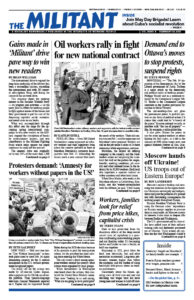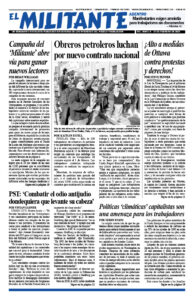Thousands of teachers, joined by contingents of firefighters, fellow unionists and others, marched to the governor’s mansion in the U.S. colony of Puerto Rico Feb. 9 to demand higher wages and oppose cuts in pensions. Protesters also denounced a U.S.-imposed plan for the colonial regime to restart making payments on its debt to the island’s wealthy bondholders. It was the second large protest by teachers in a week.
“Struggle yes, surrender no!” marchers chanted. The protests were initiated by a coalition of unions of teachers and school workers — Federation of Teachers of Puerto Rico, Únete and Educamos. Thousands of the island’s 22,000 teachers called out sick for three days leading up to the Feb. 9 march.
Teachers, who make a base wage of $1,750 a month, have not had a pay raise in 22 years. A $470 a month increase had been set to take place on Jan. 1, 2023. Firefighters make even less.
The low wages combined with rising inflation has forced many teachers to take a second or third job to make ends meet, Eva Ayala Reyes, a retired teacher and former president of Educamos, told the Militant by phone Feb. 11.
After teacher Pablo Mass died in a car accident early in the morning Feb. 1 — likely falling asleep at the wheel after a shift on his third job, as a security guard — outrage increased. As a result, “we have been winning public opinion in favor of the teachers,” Ayala said.
Puerto Rico’s working people have been wracked by a deep economic and social crisis, a result of the deepening crisis of capitalism on a world scale accelerated by the island’s colonial status. This increased as recession hit in 2006, and the colonial regime laid off more than 30,000 government workers, raised sales taxes and cut medical coverage.
Government negligence, corruption and disregard for the lives of working people made things even worse in the wake of Hurricane Maria in 2018. The population of Puerto Rico dropped 11.8% from 2010 to 2020, as young people left the island for the United States.
A U.S.-court-approved debt restructuring plan begins March 15, with a $7 billion payout to bondholders — as soon as the Puerto Rican legislature releases the funds. This is the first payment on the colonial regime’s $72 billion debt in five years, since being halted when the government said it was bankrupt.
The Barack Obama administration imposed the Financial Oversight and Management Board for Puerto Rico in 2016. The junta, as Puerto Ricans call it, was given the power to make the decisions concerning the government’s finances and to veto any of the government’s financial and budgetary decisions it objected to.
Pension cuts at center of debt ‘plan’
At the heart of the new deal is generating funds by gutting future pensions for teachers and other public employees. It replaces defined-benefit plans that have guaranteed monthly payments with the equivalent of a 401(k), which makes pensions dependent on the success of “investments” in stocks, bonds and other financial paper. At the same time, the retirement age is being raised.
San Juan teacher Luis Colón Santos told the Wall Street Journal that he had planned on retiring when he reached 55 with a $1,400 monthly pension. Under the new plan he can’t retire until he is 63 and his pension will be less than $600.
The junta and Puerto Rican government claim that the pensions of current retirees won’t be touched. “But where is the money going to come from to pay their benefits?” retired teacher Ayala said, since the payments from working teachers will now go to a new pension fund and the government still owes $50 billion to the old one. “This could produce a domino effect and eventually the whole pension system could collapse.”
Pressured by the protests, Gov. Pedro Pierluisi met with teacher representatives. He promised to introduce a bill to increase teachers’ wages by $1,000 a month and firefighters’ wages by $500.
But there’s a catch. The increase has to be approved by the junta.
“If there is money to pay the vultures $7 billion, they can’t say there is no money to pay the teachers or other workers their pensions,” Mercedes Martínez, president of the Federation of Teachers, said at a press conference Feb. 13, demanding a halt to the debt payments. “We’re not just defending for teachers but all of the people of Puerto Rico.” She announced more protest actions across the island, including on Feb. 15.

